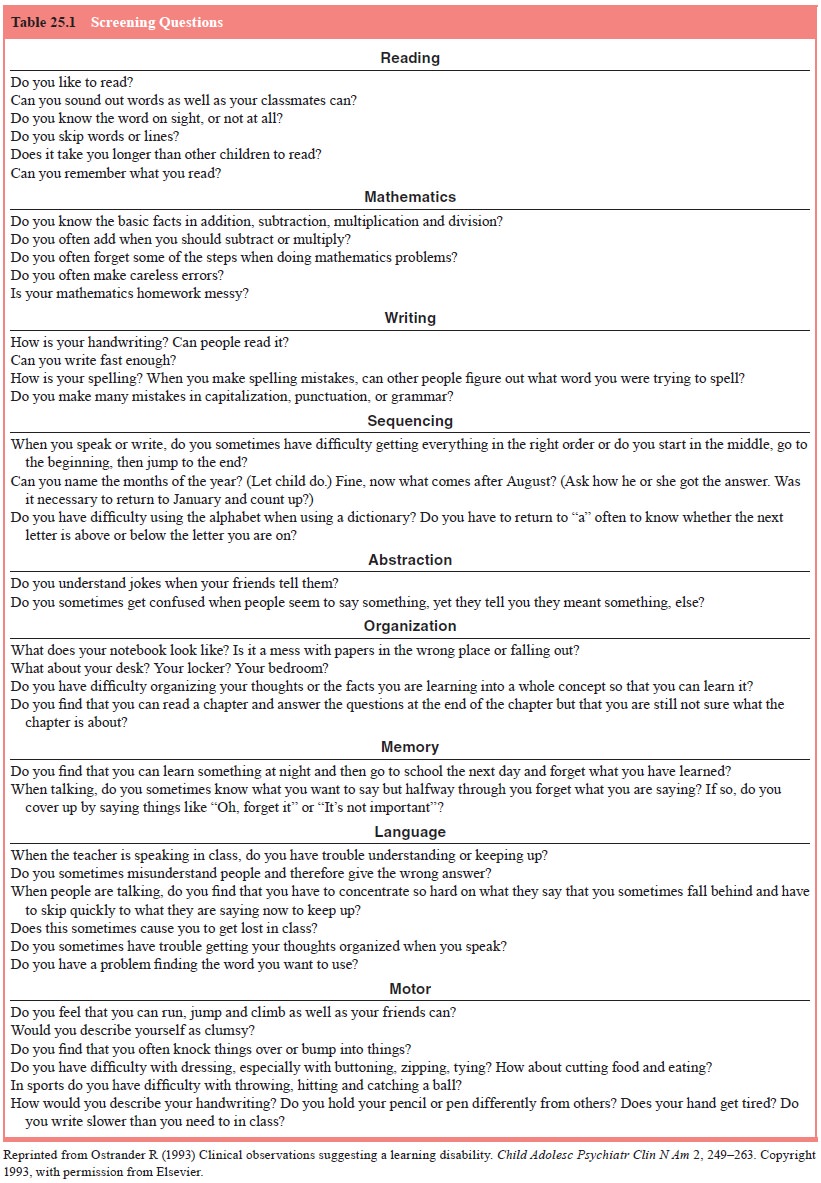Chapter: Essentials of Psychiatry: Childhood Disorders: Learning and Motor Skills Disorders
Diagnosis of a Learning Disorder or Motor Skills Disorder
Diagnosis of a Learning Disorder
or Motor Skills Disorder
If a child or adolescent is experiencing academic
difficulty, she or he would normally be referred to the special education
profession-als within the school system. However, the student with academic
difficulties often presents with emotional or behavior problems and is more
likely to be referred to a mental health professional. It is critical to
understand this potential referral bias. This mental health professional must
clarify whether the observed emotional, social, or family problems are causing
the academic difficulties or whether they are a consequence of the academic
difficulties and the resulting frustrations and failures experienced by the
in-dividual, the teacher and the parents (Silver, 1989, 1993b, 1998; Bender,
1987; Hunt and Cohen, 1984; Valletutti, 1983).
The evaluation of a child or adolescent with academic
dif-ficulties and emotional or behavior problems includes a compre-hensive
assessment of the presenting emotional, behavior, social, or family problems as
well as a mental status examination. The psychiatrist should obtain information
from the child or adoles-cent, parents, teachers and other education
professionals to help clarify whether there might be a learning disorder or a
motor skills disorder and whether further psychological or educational studies
are needed. Descriptions by teachers, parents and the child or ad-olescent
being evaluated will give the psychiatrist clues that there might be one of the
learning disorders or a motor skills disorder.
Children who experience problems in reading
typically have difficulty in decoding the letter-sound associations involved in
phonic analysis (Rourke and Strang, 1983). As a result, they may read in a
disjointed manner, knowing a few words on sight and stumbling across other
unfamiliar words. They may guess. If they have difficulty with visual tracking,
they may skip words or lines. If comprehension is a problem, they report that
they have to read material over and over before they understand.
Children with mathematical difficulties may have
prob-lems learning math concepts or retaining this information. They may make
“careless mistakes” when doing calculations. Math is a written language in that
one is graded on what is put on paper. Thus, problems with visual-spatial tasks
or with sequencing might interfere with producing on paper what is known. A problem
may not be completed or steps skipped. They might have difficulty shifting from
one operation to the next and, as a result, add when they should subtract. A
visual–spatial difficulty might result in misaligned columns or rows, or
decimals put in the wrong place.
Children who have difficulties with writing may
have a problem with handwriting. They grasp the pencil or pen differently and
tightly. They write slowly, and their hands get tired. Often, they prefer
printing rather than cursive writing. Most also have problems with the language
of writing. They have difficulty with spelling, often spelling phonetically.
They may have difficulty with grammar, punctuation and capitalization (Poplin et al., 1980).
Many if not most students with a learning disorder
also have difficulties with memory or organization. The child or ado-lescent
with a memory problem has difficulty following multistep directions or reads in
a book but forgets what was read. Others might have sequencing problems,
performing instruc-tions out of order. In speaking or writing, the facts may
come out but in the wrong sequence. Students with organizational dif-ficulties
may not be able to organize their life (notebook, locker, desk, bedroom); they
forget things or lose things; they have dif-ficulty with time planning; or they
have difficulty using parts of information from a whole concept or putting
parts of information together into a whole concept.
Children and adolescents with a developmental
coordina-tion disorder may show evidence of gross motor or fine motor
dif-ficulties. The gross motor problems might result in difficulty with
walking, running, jumping, or climbing. The fine motor problems may result in
difficulty with buttoning, zipping, tying, holding a pencil or pen or crayon, arts
and crafts activities, or handwriting. Both gross and fine motor difficulties
may result in the individual performing poorly in certain sports activities.
Ostrander (1993) and Silver (1993a) suggested a set
of “systems review”-type questions (Table 25.1) to be used during an interview
with parents or the child or adolescent with aca-demic difficulties suspected
of having a learning disorder (learn-ing disability) or a developmental
coordination disorder. These questions focus both on the specific areas of
skills and on the possible underlying processing problems.

Related Topics